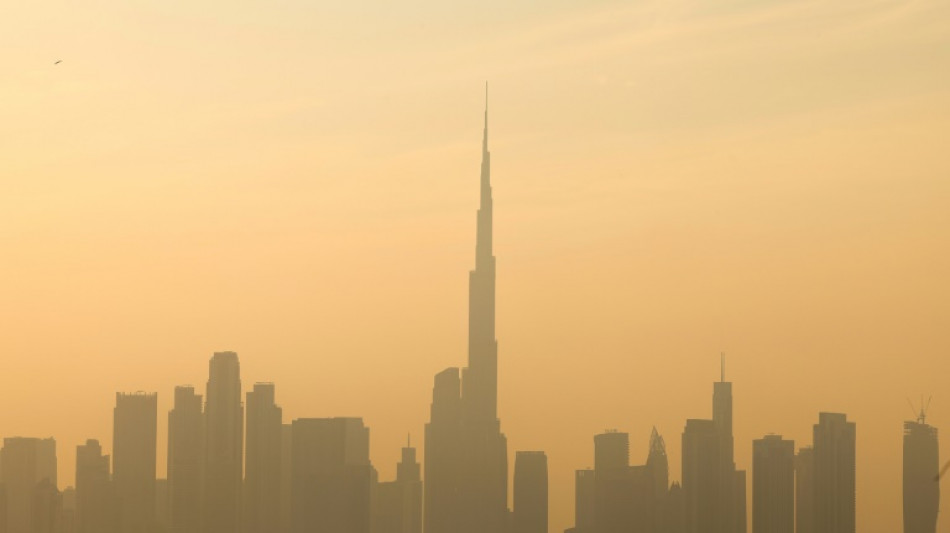

'Time to deliver': pressure grows for climate deal in Dubai
The president of the UN's COP28 climate talks urged negotiators to compromise on Sunday, warning "failure is not an option" as efforts to reach a deal on phasing out fossil fuels met resistance from top oil exporter Saudi Arabia.
Less than 48 hours before Tuesday's scheduled deadline, the United Arab Emirates' COP28 chief Sultan Al Jaber said: "I want everyone to show flexibility to act with urgency and to find the common ground.
"The time has come for us to shift gears. The time has come for us to deliver," he told reporters.
- 'We need to find consensus' -
Jaber organised a majlis -- a traditional Gulf Arab meeting held in a circle -- with ministers in a bid to reach a compromise.
"Failure is not an option. What we are after is the common good. What we're after is what in the best interest of everyone, everywhere," he said ahead of the meeting.
"We need to find consensus and common ground on fossil fuel, including coal," Jaber added.
Earlier, Germany's chief negotiator Jennifer Morgan urged Jaber, the UAE's climate envoy and state oil company chief, to push for an ambitious agreement.
"There is a real urgency of action to keep the planetary pain threshold of 1.5 degrees in reach," she said, referring to the goal outlined in the 2015 Paris agreement.
"The COP presidency has reiterated many times that they are here to facilitate an ambitious decision. This means there needs to be strong language on the phase-out of fossil fuels in line with 1.5C."
- 'Blockers at every stage' -
Saudi Arabia, the world's top oil exporter, is said to be the chief opponent of attempts to phase down or phase out fossil fuels, along with India, a major coal producer and consumer.
"I've been following Saudi Arabia in this process for over 30 years and they have been blockers at every stage," said Alden Meyer, senior associate at E3G climate think-tank.
"However, if the (COP28) presidency and other countries can succeed in getting China, India, Russia and others to move and accept some kind of language on fossil fuel phase-out, the pressure on the Saudis will be overwhelming."
A strong final agreement also depends on wealthier nations pledging to provide financial help so that emerging nations can install more solar and wind technology and adapt to the impacts of climate change.
"It is clear that least developed countries will not be able to go at the same speed as G20 economic powerhouses," Morgan said.
"They have to meet development needs but also have the opportunity now to leapfrog unsustainable decisions. This is why we need a package that combines energy transition and energy access."
- 'Deep cuts' -
United Nations Secretary-General Antonio Guterres kept up the pressure, urging delegates to agree big cuts to emissions and calling on oil and gas companies to lead the energy transition.
"I urge fossil fuel companies to use their enormous resources to lead the renewables revolution," he told the Doha Forum in Qatar.
"And I urge global leaders at COP28 in Dubai to agree on deep cuts to emissions in line with 1.5 degrees. That is the only road not only to climate sustainability, but economic sustainability."
- Prayers from the Pope -
At St. Peter's Square in the Vatican, Pope Francis, who missed COP28 following a bout of bronchitis, instructed his followers to pray for a good outcome in Dubai.
"I ask you to pray for us to have good results to safeguard our common home and protect populations," he said during his weekly public prayers.
- 'Not nearly enough' -
Adding further urgency, the International Energy Agency released an assessment showing that non-binding pledges by governments and oil and gas companies so far at COP28 would fall far short of what is required.
The pledges -- tripling renewable energy and doubling energy efficiency by 2030, and sharply reducing methane emissions by energy companies -- would cut energy-related greenhouse gas emissions by only 30 percent of what is needed by 2030, the IEA said.
"While the pledges are positive steps... they would not be nearly enough to move the world onto a path to reaching international climate targets, in particular the goal of limiting global warming to 1.5 degrees Celsius," it said.
(Y.Rousseau--LPdF)



